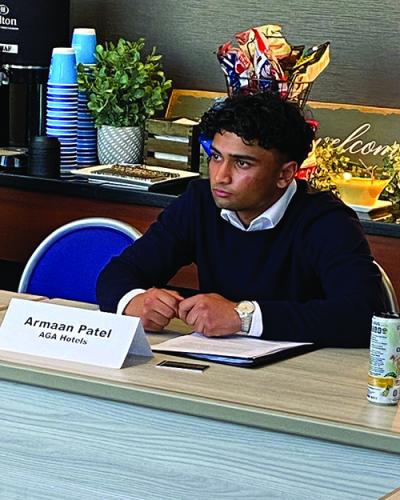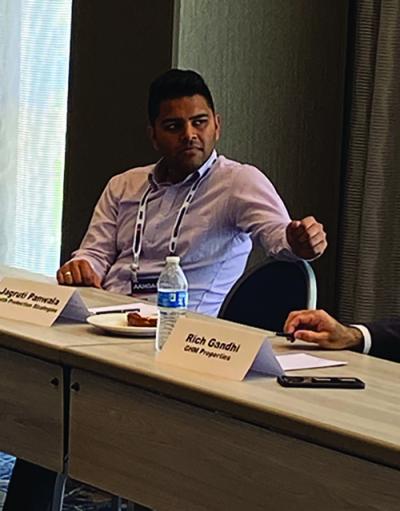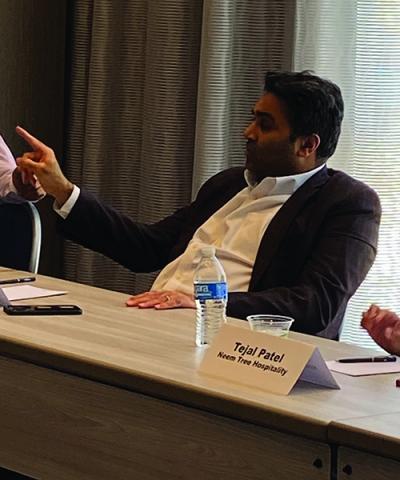At a roundtable discussion that kicked off the annual AAHOA Convention in Baltimore, Hotel Management and BWH Hotel Group gathered some of the best, brightest—and youngest—members of the organization to discuss the most pressing issues facing franchisees today—from hybrid hospitality to crypto payment, nothing was off the table.
There is no lack of pent-up demand for travel going into the summer months. It turns out, for hoteliers, there is no shortage of pent-up expression, either.
That was on full display during a roundtable discussion held with a cross-section of AAHOA membership at the start of the organization’s annual convention in Baltimore. Though the overarching topic of the roundtable centered on hotel development and how the next-generation hotelier was doing it, the discussion turned into a free-for-all on all things industry related: onerous and honest brand standards, evolving food and beverage tastes, monetization of square footage, honoring and exceeding generational lineages and how AAHOA is evolving and adapting to hospitality within a new paradigm.
And that just covered the first hour.
No matter if you are a younger or older hotelier, when it comes to buying or building hotels, many things remain the same: economics, oftentimes, dictate the outcome. “It all depends on where the cycle is and where your portfolio sits within the cycle,” said Ashish Sangani, owner of Giri Hotels.

roundtable. He was recognized as AAHOA’s Outstanding
Young Professional Hotelier of the Year 2022. (Hotel Management)
What has shifted for the younger generation of hoteliers is the type of assets they are interested in building or acquiring. And though brands continue to dominate the landscape, Jagruti Panwala, past chairwoman of AAHOA and president and CEO of Wealth Protection Strategies, said that the newer generation is on the hunt for more unique assets. This distinctiveness, she said, forces brands to be less intransigent—”more flexible,” she said, “to really understand what hoteliers want.”
One of the reasons brands still have clout—one that won’t dissipate anytime soon—is because of lender requirements, argued Rich Gandhi, CEO of GHM Properties. “That’s why you can never be 100 percent independent,” he said, acknowledging it is why many owners now embrace collections and soft brands.
There is no mistaking that every hotel, no matter the brand, is distinct, filled with its own idiosyncrasies. No matter how similar a hotel may be, they all occupy different space. “Each is individualized based on location, building style, number of floors, type of management—so there isn’t one answer,” said Ashok Patel, owner of Jamsan Hotel Management.
One of the notable reveals of the discussion focused on exterior-corridor hotels. Passed off as prehistoric, this type of exterior asset is eternal. Outside the oddity, the pandemic has helped burnish these types of assets. Open your guestroom door and you’re outside. “It’s an experience that most major brands can’t sell,” said Ashok Patel.
Tejal Patel, a third-generation hotelier and CEO of Neem Tree Hospitality, is in the throes of building a brand-new exterior-corridor property. “Whatever one brand doesn’t let me do, I do it somewhere else,” she said, though conceding that these types of projects perform better in warmer-weather climates.
Hard or soft, exterior corridor or not, younger-generation hoteliers want to lay down their own imprint—an indelible mark showcasing their personality on a project. “I love doing some sort of twist—especially if it’s a branded box,” said Tejal Patel. She recounted opening a property a couple years back and wanting to add an Instagram wall to the space. “It’s awareness, right?” The designer, however, had issue with the idea. “I’ll make it myself if I have to,” Patel ended up saying.
On Loan
One thing there is no disputing is that hotels take money to buy and build. The hotel industry’s foundation is large bank debt, sprinkled in with equity. Hotels, like most other big-ticket items, are mainly financed. Obtaining the right amount of debt at the right terms is as much a financial calculation as it is one based on camaraderie and relationship.
Armaan Patel is the founder of AGA Hotels, based in California. He is barely out of high school, but already has a seat at the table. He’s already acquiring hotels and he’s doing it with lenders who have his back because they also had his dad’s back for years. “I use the same [lender] my dad uses,” he said, referencing a community bank. For AAHOA members, tight relationships with local and regional banks allow them to succeed. “They trust my dad, so they trust me,” Armaan Patel added.

CapitalGroup, being prepared in terms of paperwork,
bids,underwriting and more helps him build his credibility.
(Hotel Management)
“The banks my dad built relationships with are in small, rural cities. So when they have a hotel in their portfolio, that’s one of the biggest revenue contributors to the bank,” said JR Patel, managing partner at Viking Hospitality. “My dad never had a late payment. That relationship was handed down to me and now it’s up to me to keep that relationship; to keep the family name going.”
It’s then up to the younger generation to keep the torch aflame and not squander the goodwill. “Once you’ve had two or three [loans] on your name, then they are like, ‘All right, he knows what he’s doing.’ Now I can get up to $10 million without my father. The bank is ready to trust me with this,” JR Patel added.
For Dave Shah, founder of Pineapple Capital Group, stepping out of his father’s shadow is an act of both deference and self-reliance. “Even though [the banks] give us the benefit of the doubt that, ‘Oh, hey, Dave’s father, we’ve been banking with him for the last 20 years.’ I understand they gave me the benefit of the doubt, but I go further and make sure any presentation, underwriting, proforma, general contractor bids—everything a banker needs, he should have it,” Shah said. “I want them to see me and the level of credibility that I’m bringing to the table. My father is not going to be in the same room as me for the next 15 years trying to cut deals.”
At Our Expense
The cost of running a hotel continues to climb, complementing an already tenuous revenue picture. Profit margins are shrinking against expanding utility and labor costs, to name just two line items. The pandemic put hotel owners on notice that it could all be over in a split second. In fact, operational costs have been escalating for some time, according to Sangani. “Over the last five years, the cost of operating has gone up almost 100 percent or more,” he said. He pointed to the increasing cost of housekeepers and front-desk personnel. He’s not wrong: According to the Bureau of Labor Statistics, average hourly earnings for nonsupervisory employees within the leisure and hospitality sector were up to just over $17.50 in April 2022, 22 percent higher than at the same time in 2019.
For many businesses, rising costs means charging customers more for services. “We have to figure out a way to reduce our costs,” said Ashok Patel, “not necessarily charge guests more.”
Others, like Rich Gandhi, think that hotels need to start acting more like other businesses that pass some of the economic hardship off to customers. “Almost every industry you go to, they have a credit-card surcharge,” he said, citing an Outback Steakhouse he recently ate at that charged the fee or gave him the option to avoid it by paying cash. “Why can’t hotels do that?” he asked, before noting that, oftentimes, the brands don’t allow it.

voices on the roundtable. (Hotel Management)
A third-generation hotelier, Tejal Patel worries that her antecedents will end up doing better in the hospitality industry than she. “I’ve seen my grandparents, parents … and I’ve seen the money they got out this. I don’t think that being a hotel owner is going to make me as much money as I saw with them with all this stuff that’s going on,” she said. “When it comes down to building my investment portfolio, I’m not going to just stick with branded hotels. I’m going to do an independent or a restaurant or maybe vacation rentals. As the younger generation, we’re not looking to just have a portfolio of big-box hotels.”
A New Revenue
One way hoteliers are coping with the revenue strain is by seeking out new streams of it. That means activating every square foot of real estate and, moreover, the unorthodox use of it. During the pandemic, Tejal Patel did this and was able to find dollars where there were none before. One of her hotels had only a small boardroom, but interest from larger groups. In order to satisfy this demand, Patel opened up the breakfast space, which has good acoustics, and used it to host these larger gatherings. She’s also a proponent of creating co-working spaces within the hotel and combatting labor issues by installing self-service bars, for example, where guests can pour their own beer by swiping a credit card.
Into the Future
The younger generation of hoteliers has their own ideas on the industry that run simultaneously similar and contrary to how their parents and grandparents did it before. And that’s OK; that’s progress. Younger kids, for example, are growing up in a world where NFTs and cryptocurrency aren’t some exotic newbs, but normal. Though the older roundtable participants were skeptical of the idea of hotels accepting crytpo as payment, both Tejal Patel and Armaan Patel—the younger breed—did not squash the idea; in fact, they see its inevitability.
Meanwhile, as the U.S. barrels ahead into possible recession amid a still gurgling pandemic that won’t turn off, the hotel industry is rolling with the punches, developing and operating hotels in a way that tries to stay ahead of the trends. With AAHOA members owning an estimated more than 60 percent of U.S. hotels, the leadership starts with them.
“Things are changing,” said Brad LeBlanc, SVP and chief development officer of BWH Hotel Group. “You guys are at the front end.”
